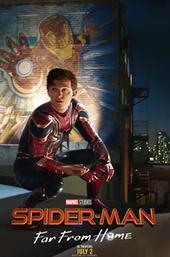After the events of 'Spider-Man: Far From Home', Peter Parker (Tom Holland) is no longer able to hide his identity as Spider-Man after being outed to the world by J. Jonah Jameson (JK Simmons). With MJ, (Zendaya) Ned (Jacob Batalon), and Aunt May (Marisa Tomei) caught in the fallout, Parker enlists the help of Stephen Strange (Benedict Cumberbatch) to try and make the world forget he's Spider-Man. However, the plan goes horribly awry when the multiverse opens and sends enemies of Spider-Man towards him, seeking revenge...
Ever since 'Avengers Assemble', Marvel movies have always been able to deftly handle large casts and really turn them into ensemble pieces. While they may have extended runtimes, they're still able to keep the pacing up, keeping all the plates spinning while doing so, and lock everything together to make it so that you're never terribly lost. One of the keystones of this is by making the story as remarkably simple as they can, distilling it down into a single sentence - they have to stop Thanos from wiping out half of all life, Black Widow has to free the other Black Widows, Captain America discovers HYDRA has taken over SHIELD, and so on. In 'Spider-Man: No Way Home', the central story is Peter Parker wants to make the world forget him, but winds up opening a rip in the multiverse which sends many recognisable faces towards his universe.
You might think that the idea of multiversal anomalies and different characters from different iterations of Spider-Man floating through one single movie might be dizzying and altogether bloated, yet 'No Way Home' makes all these dissonant pieces hang together. It's not that Spider-Man as a concept has varied so wildly from iteration to iteration - like Batman, for example - that they couldn't possibly sit together, but rather than the unlikelihood of seeing them all together on one screen seemed a distant reality. Yet, the influx of multiverse into cinematic franchises means nothing is beyond the scope of imagination.
'No Way Home' keeps up the comedic tone of the past two movies while giving Tom Holland a better chance than he's had in some time to flex his screen presence and portray Peter Parker - not Spider-Man - with a real sense of vulnerability. Given that the stakes are simultaneously big and small - Parker and his pals trying to get into college, multiverse rift opening in the skies sending villains towards their universe - the movie's script is able to give both of them equal prominence. When you're trying to get into college, impressing an admissions officer is just as important as battling an eight-tentacled mad scientist or an insane billionaire who flies around on a skateboard.
Stocking up a movie with as many villains as it does and as many reveals as it has shouldn't work. Just look at 'Spider-Man 3'. It can often come across as desperate; that the filmmakers are hurling everything and everyone at the screen in order to keep the audience in play. The results then tend to feel bloated and saggy. Yet, in 'No Way Home', there's a marvellous (hah) sense of pacing that never lets you rest as it swings from scene to scene, only pausing for the biggest emotional moments. When they arrive, they feel earned and Holland's performance and screen presence allows them to carry through. By now, you'll notice that we've dodged and pirouetted around revealing anything about 90% of the movie and we're going to keep it that way.
Rest assured, 'Spider-Man: No Way Home' is an enjoyable experience at the cinemas, and shouldn't work nearly as well as it does. Yes, it is obvious fan service in parts and, yes, you're never completely surprised by any of it, but it still works because the whole thing is so well-executed that even when he's falling to the ground head first, it looks like it's doing it all on purpose before it swings up and away, and soars on again.




















































































